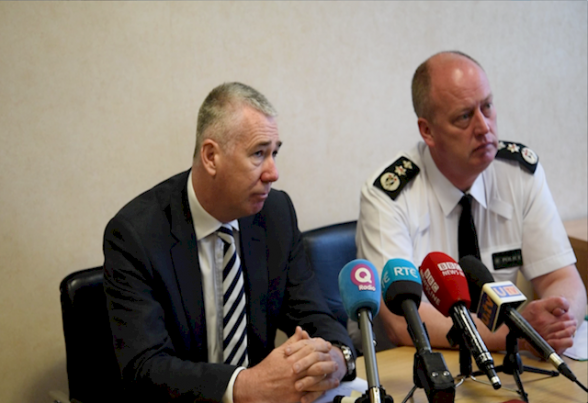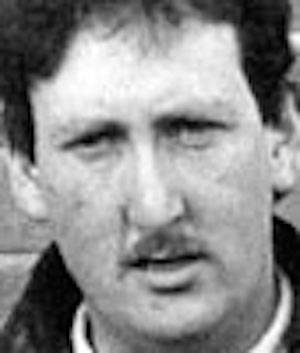
Bedfordshire top cop Jon Boutcher heading up probe into 50 murders by Stakeknife
THE PSNI has revealed today that Chief Constable Jon Boutcher, from Bedfordshire Police will lead the investigation into a range of activities surrounding an alleged army agent known as Stakeknife.
The investigation, codenamed Operation Kenova, will look at Stakeknife’s role in around 50 murders.
Stakeknife was unmasked over a decade ago as west Belfast man Freddie Scappaticci.
The probe has now been widened to look at crimes, by IRA members, agents, Army and police handlers.
Two of those he murdered for being informants/agents came from Derry.
One of his victims was Paddy Flood.
Flood, 29, a top Derry IRA man, was abducted, tortured and shot dead in Fermanagh in July 1990.
His family claim that Flood was not an informer but a dedicated and highly effective paramilitary.
There have been claims he was murdered at the request of the British Army to stop his gun and bomb attacks in the city.
Another was Frank ‘Franko’ Hegarty. The 45-year-old worked for the same British Army unit as Scap.
He fled Derry fearing he had been exposed in 1990. He was coaxed back after being given an assurance of his safety. Hegarty was taken to Donegal, where he was tortured and shot dead.
A tape of Hegarty’s “confession” was later supplied to a journalist in an attempt to justify the murder.

Paddy Flood who was victim of IRA informant hunter Freddie Scappaticci
He only came home after Sinn Fein chief Martin McGuinness assured his mum Rose that no harm would come to him from the IRA.
Chief Constable George Hamilton said today: “After taking a number of issues into consideration, I have decided that a team resourced with external officers and staff funded by the PSNI is the most appropriate way forward, given the size, scale and complexity of the investigation.
“Chief Constable Boutcher will have the delegated authority of me as the Chief Constable of the PSNI. He will appoint a Senior Investigating Officer and a team of detectives from other UK law enforcement agencies to progress this investigation.
“I believe this option contributes towards community confidence and reduces the impact on the PSNI’s ability to provide a policing service today.
“I have every confidence in Chief Constable Boutcher and I have no doubt his previous experience when it comes to dealing with highly complex and sensitive investigations will be of great benefit to him as this investigation progresses.” Chief Constable Jon Boutcher, from Bedfordshire Police, added: “I am humbled to have been asked to lead such a critically important and complex investigation.
“I do not underestimate the huge task of establishing the circumstances behind how and why these murders occurred during those dark days.
“My principle aim in taking responsibility for this investigation is to bring those responsible for these awful crimes, in whatever capacity they were involved, to justice.
“The recruitment process for the investigation team will begin immediately, this will require time and I ask for a degree of patience as I do this.
“As soon as officers and staff are in place the investigation team will begin reaching out to victims, victims’ families and all interested parties to receive information. Updates regarding this will be provided on the Op Kenova investigation website at www.opkenova.co.uk
“I am committed to doing all I can to find the truth for the victims and their families. It is them who we should be thinking of throughout.
“It must be extremely hard to have listened to various commentaries within the community and the media about how and why their loved ones died. I hope this investigation ultimately addresses the uncertainties and rumours. All I can promise is an absolute commitment to pursuing the truth.”
The focus of the investigation will be:
– whether there is evidence of the commission of criminal offences by the alleged agent known as Stakeknife, including but not limited to, murders, attempted murders and unlawful imprisonments. – whether there is evidence of criminal offences having been committed by members of the British Army, the Security Services or other Government agencies, in respect of the cases connected to the alleged agent known as Stakeknife. – whether there is evidence of criminal offences having been committed by any other individual, in respect of the cases connected to the alleged agent – whether there is evidence of the commission of criminal offences by any persons in respect of allegations of perjury connected to the alleged agent. If the team identifies matters which indicate that former or current police officers may have committed criminal or misconduct offences, they will be formally and expeditiously referred to the Deputy Chief Constable of the PSNI who will refer the matter to the Office of the Police Ombudsman.
Any other matters falling outside the parameters of the investigation will be brought to the attention of the Chief Constable of the PSNI by Chief Constable Boutcher for consideration.
The PSNI Chief Constable will, if necessary, consult with the Director of Public Prosecutions or the Police Ombudsman as to the appropriate basis on which to address these additional matters.
The recruitment process will begin shortly for the team which will be based in secure accommodation in London and will carry out enquiries in Northern Ireland as necessary.
The investigation team will not include personnel who are serving in or have previously served in the RUC, PSNI, Ministry of Defence or Security Services.
The PSNI will not have any investigative responsibility but will have the discretion to support any investigative requirement of Chief Constable Boutcher in Northern Ireland.
The Chief Constable of the PSNI will ensure that mechanisms are in place to update the Director of Public Prosecutions as to the progress of the investigation.
Once the investigation has concluded, a report will be provided to the Chief Constable of the PSNI including any recommendations for the consideration of the DPP.
Chief Constable Boutcher will report to the Chief Constable of the PSNI who will be accountable to the Policing Board for the investigation. It is envisaged that Chief Constable Boutcher will accompany senior officers from the PSNI to brief Policing Board members as appropriate on governance and logistical issues.
Tags:




